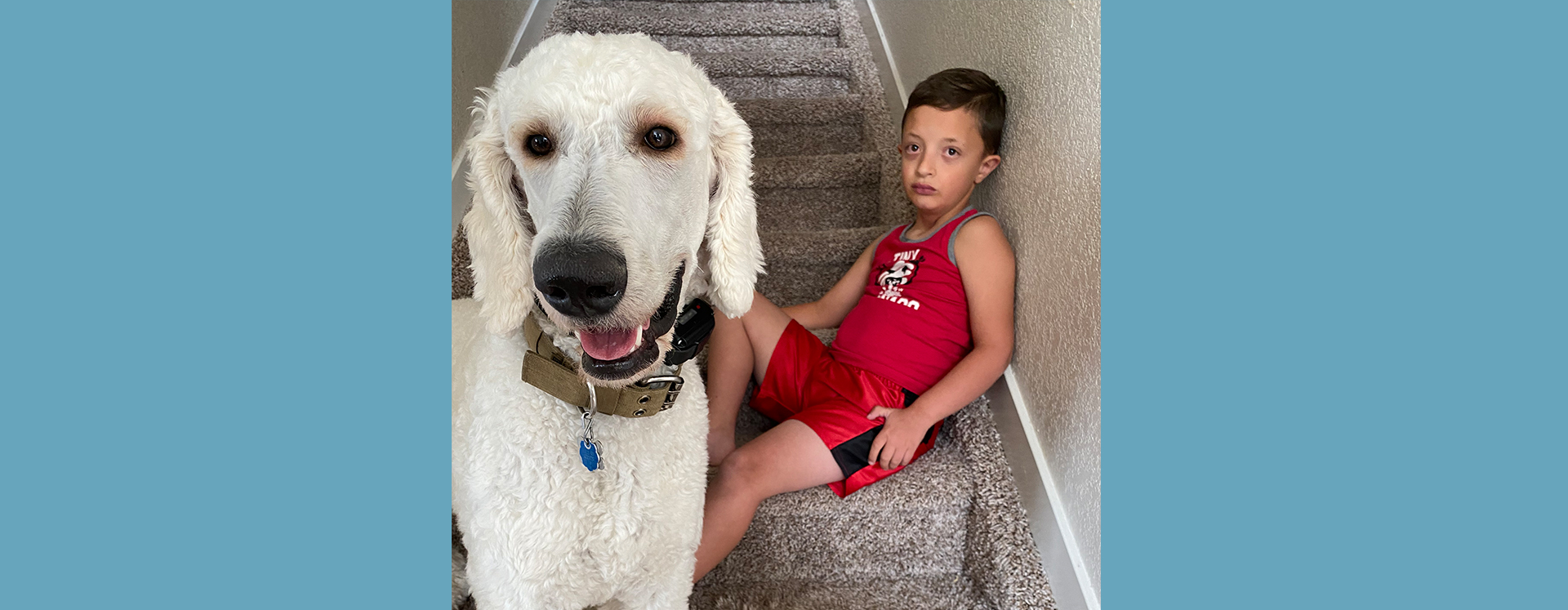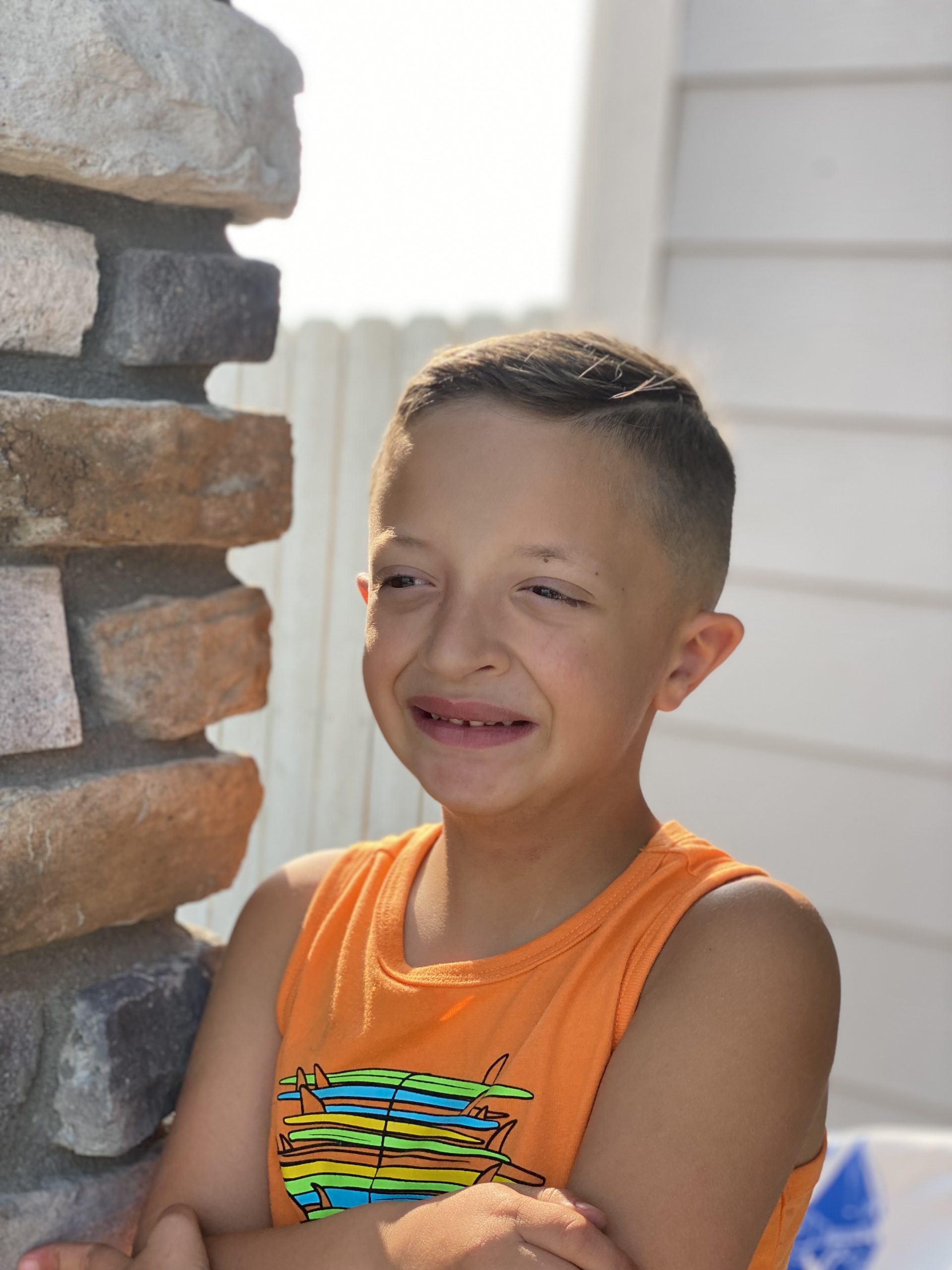Jennifer Defosses and her husband are not strangers to challenges. As a military family, they have moved around the country from Boston to Virginia to Colorado. With four children in tow, this is never an easy feat.
When you add in a child with a rare genetic condition, even the most ordinary day can be challenging. Or, in Jennifer’s case, it can be incredibly beautiful.
Jennifer’s youngest son, Giovanni was born in 2014 and came into the world weighing an extremely small 5 pounds. Jennifer knew right away something was not right. Her other children were 10, 9, and 8 pounds at birth. Also, a mother’s intuition is rarely wrong.
At the age of two months, Giovanni had been sick with numerous respiratory issues, kidney infections and was labeled by doctors as a “failure to thrive.”
“What a terrible term,” Jennifer says. “Why can’t they come up with something better?” But, Giovanni was destined to beat the odds. In fact, in the Wolf-Hirschhorn Syndrome community, he is nothing short of a miracle.
After numerous consultations, a doctor handed Jennifer a paper printed from the internet that discussed this rare disease. “This is what your son has,” the doctor said to her as he handed the computer printout. “We don’t know anything about it and never heard of it before, but here is some info.”
Jennifer, and her husband–in shock–knew they had work to do. “We were told to plan his life based on the life expectancy of his syndrome,” says Jennifer. “Fifty to sixty percent of children born with this syndrome do not survive past the age of two.”
After a pause, Jennifer says, “we don’t really talk about Giovanni’s syndrome because it doesn’t define him–that’s just not him.” At seven years old, Giovanni attends school, eats food by mouth, and manages to communicate exactly what’s on his mind.
Jennifer credits it all to the family’s attitude and of course, MGA Homecare.
Wolf-Hirschhorn’s Syndrome
On the day the doctor handed her a computer printout of the definition of Wolf-Hirschhorn’s Syndrome, he told Jennifer, “he will write his own book, in his own way, in his own time.” She has hung on to those words ever since.
“On those bad days, those words were my mantra and it kept me going,” Jennifer says. “Although that genic doctor was giving me bad news, he was also giving me hope.
”We just picked ourselves up and kept going. And that is what he is doing now,” she says. “He is so full of determination. When he sees someone doing something that he wants to do, he is determined that he will do it as well.”
After Jennifer turned to Facebook to find a community of similarly challenged families, she learned a lot. “90 percent of kids with this syndrome have G tubes,” she explains. “And the vast majority are in wheelchairs and are completely nonverbal.” Giovanni has never been tubed, walks on his own, and is working on his language development every day. “I just wanted him to be treated like a regular kid,” says Jennifer.
And, this in itself, has been a challenge. “He gets sick very easily and can quickly down spiral,” says Jennifer. All her children were homeschooled last year during the height of the Covid pandemic and they never left home.
But this family is not afraid of challenges, clearly. So they did what has served them well, they just kept going.
Children’s Hospital Colorado Ambassador Program
Giovanni had been going to Children’s Hospital of Colorado since he was just over two years old. So, he has been able to grow up there and his doctors have continued to be amazed by his development.
So much so, he has been nominated to the hospital’s ambassador program. “Over the next two years, beginning on January 2022, Giovanni will begin a two-year commitment of commercials and appearances to help the hospital’s fundraising efforts. “Giovanni is so incredibly funny and people just love him,” says Jennifer.
So now, Giovanni will take his determination, personality, and grit to help bring awareness of his syndrome to more people.
Why is Giovanni the way he is? How can a child go from being given to what Jennifer calls, “a death sentence” to a child who can communicate, be silly, be sly, be funny, and show compassion? What does she attribute it all to?
“I want to show the families that they can be successful. Just because your kid has something like this as a diagnosis. It doesn’t have to be a life sentence. Don’t short-change your kid,” she emphasizes.
“We never short-changed G,” Jennifer says using his nickname. “We taught our kids that you treat him like you treat everyone else. And I think that made a world of a difference,” she explains. “When we got G’s diagnosis, my husband and I looked at each other and said that we are looking at it like he is going to live a normal productive life.”
Has his life been different than other kids? Yes. Has he had to adapt to do things? Yes. Does the family suffer? Sometimes, she says. “That’s the part that is hard,” she says. “Because G has low muscle tone, gets sick easily, and is mentally delayed, it makes life challenging.” But the family doesn’t focus on any of that.
“We choose to look at life as we have just today,” she explains. “Let’s do what we can for today.”
The Benefits of MGA Homecare and Therapy
Jennifer has been with MGA Homecare for Giovanni’s therapy since he was three years old. “He gets physical therapy, occupational therapy, and speech therapy three times a week,” explains Jennifer. She believes that these interventions have helped him thrive.
“We plan to just let him be a normal kid just like everyone else,” she says. “He just learns a little differently.” Being positive is a way of life for Giovanni’s family. “He has taught my other kids a lot and the positives of having G in our lives far outweigh the negatives. They understand that everyone is different–it’s just a life lesson they learned.”
MGA is a touchstone for Jennifer. Because the Defosses’ are a military family, they live far from other extended family members. Jennifer says that anytime she needs to talk or just vent, someone from MGA is always available. “With MGA therapists, we all become a family. When they come into the house, I tell them that they are now a part of the family because they end up spending a lot of time doing things for my child.
That is how we operate,” says Jennifer. “Just like family.”


